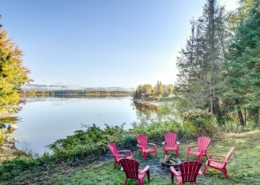Airbnb vs. Renting: Which Strategy Generates the Best ROI?
Before the start of 2020, Vacation rental business was seen as the most profit-producing option among real estate investors. As only a minority exist in the world who don’t want to see different parts of the world, the rest were eager to go out and explore, and it is proved by the fact that in the year 2019, the revenue generated by the vocational rentals has summed up to 17.5 million USD, which was the reason that many traditional rental owners had also begun to try their hand in this lucrative system of renting.
But the outburst of Covid-19 worldwide has put a direct full stop to tourism, let alone the vacation rental system. It has questioned all the owners who make huge money but short-term rental and urged them to change their investment approach. In the current scenario, where we are not free from the risk of being infected, schools, colleges, and offices are a dream to conduct normally; why would a person take his family on vacation in an unknown place, across boundaries? This leads to the debt that with the absence of international travel, can domestic travel be profitable for Airbnb hosts to wait for guests, or should they turn to the traditional rental system and settle for less?
This article will discuss the possibilities of short-term rental and traditional rental systems on various criteria, and one can choose among them which is going to be his real estate investment strategy.
What is short-term rental and long term rental system?
Short-term rental is a rental system based on tourism where property owners from different places rent their property to people ( mostly tourists) for short periods like 15 days or one month, etc. the place where the host offers his place and guests want to live there is an online platform, Airbnb. This platform charges money, but it is beneficial for the property owners ( called hosts on Airbnb) as the charges will cover the marketing of their properties across the globe, as well as payments, will also be taken care of.
How to choose the short-term vacation rental platform that’s best for you read here.
While in the traditional renting system, the property is rented for six months or more. In contrast, the owner will be on his own to find people to rent and will be in charge of collecting payments as well.
Airbnb vs. Renting: Rental Income
The main factor to consider while considering one between Airbnb and traditional renting is the income you obtain from them. But neither of them is dominating the other one as there are different aspects which will affect your income in each case. Let’s look into both approaches :
Based on the price of the rental property:
If you are a host on Airbnb, your same property will generate different amounts of rents for the same duration. As you can increase rent in the season when your place is in high demand, last-minute bookings and some special arrangements will also be the reason that you can charge more from your guests. Usually, guests will be happy to pay extra to have things on their accord.
While being a traditional renter, once you entered a lease agreement with your tenant for a particular duration, like a year or two, then you will be receiving the same amount of rent, but you will be getting it regularly; hence your income is secure.
Based on Upfront and ongoing expenses on your property:
As a host on Airbnb, the property you are offering your guests should be in its best condition, including fully furnished and stocked. Not only higher upfront costs, but the ongoing expenses are also high as after each guest check-out, you need to replace and restock many things. These include bedding, towels, Wi-Fi, Appliances, Cleaning service, other utilities, etc. In case you have many different properties, you have to get higher service from a property management company, which generally charges more in case of temporary rental cases. Hence, more rents come when you pay more on your maintenance.
Suppose you will come less across these types of charges if you decide to go for traditional renting. All you need to invest once in the look and other facilities of your property before you hand it to your tenant, from them till your agreement ends it’s your tenant’s responsibility to look after your property. While you only need to pay in case of some emergency whose chances are very less. The basic needs that you need to attend as a traditional renter are providing them water, trash removal, sewage, garden maintenance, etc.
The effect of demand on your rental income
Hosting your property and service on Airbnb, there will be a time in the year where you will face a low occupancy rate; hence your income will also retard. This time is called the low season. On the contrary, your properties will be on extremely high demands in the high season period, where you can increase your price and even charge more for other services also.
But your property will not be in demand from the day you posted it on Airbnb as a host. First, you need to earn guests’ trust by tempting them with low prices, and then once you start getting good reviews, you can increase your price.
While traditional rentals do not face these kinds of seasons, your income will be safe and secure.
Airbnb vs. Renting: Legal Rules and Regulations
While the traditional renting system has been followed from the very beginning, there are not many rules against it if you are following a legal lease agreement. On the contrary, short-term rental units face strict regulation, as they vary from boundary to boundary under different laws you can check which are enforced in your area.
In many places, one can only put his place as a vacation rental if he has the permit. This permit will be followed by the extra tax for the same. If a person tries to escape this procedure, he might not just be fined but might even face legal action. Apart from the law, you also need to seek the consent of the apartment building or the gated community that your vacation rental belongs to.
Vacation Rental vs. Traditional Rental Property Insurance
Both Airbnb host and traditional renter, both of them need to have a property Insurance. Although Airbnb Host Guarantee is there to protect the rights of its hosts in a year, an Airbnb rental is occupied by a different number of guests; hence the risk of damage that the property may suffer is more. So, it is advisable to go for vacation rental insurance. Traditional renters are protected by commercial property insurance. The charges of the insurance property will be different for different places and based on the risk involved.
Short-term Rental and Traditional Rental Tax Considerations
Airbnb surfers different tax implications worldwide due to the involvement of international tourism. Like an Airbnb host has to pay federal tax, occupancy tax, along state income tax.
The traditional renters also pay tax on the rental income they earn but have much relaxation in it. Depending on the other factors, they may be charged with other property-related taxes as well.
So instead of suffering from all these rules, one must see a professional tax consultant. He not only will tell you about all the taxes you have to pay but also will give you suggestions to save your money.
Airbnb vs. Renting: Pros and Cons
Airbnb Pros
1. More opportunity to maximize income
While hosting your properties, you can set a high price and earn more rent, but this is not where your scope of earning ends. Other than renting your place, you can also sell services and earn from them. Like you can join hands with a tour guide and a car renting service and advise your guest to hire them, by this you can earn a commission. You can even provide laundry and cleaning service while your guests stay and earn more.
2. More Flexibility in Terms of Pricing
While you have to attract more guests by giving them some tempting offers like a discount on booking for a month, etc. You can recover your loss by charging extra on last-minute bookings and weekend bookings. By these, your income will not be affected, and you can put effort into looking for new clients.
3. Protection even with no Lease Agreement in Place
Airbnb hosts rent their properties without any problem. Even though there is no lease agreement, they have the right to set home rules according to them. In violation of these rules, a host can get justice without any delay; all he has to do is to contact Airbnb. No court, and the matter will be solved.
4. Protection for Hosts (Airbnb Host Guarantee)
Airbnb has made full arrangements to protect you from danger while renting your properties to guests. With the help of its review system, you do a mini background check on the guest seeking your service and decide if you want to rent him or not. An Airbnb host is also safe under the Airbnb Host Guarantee, which offers compensation up to one million USD.
Airbnb Cons
1. Damages
While the majority of booking goes peacefully, once in a while, some guest just books your place to have a party. In these party types of booking, your rental property is at a huge risk of damage. This is one of the cons of short-term renting, and as they are paying you handsomely, you just can’t restrict their freedom if they want to party.
2. Higher Expenses
After every check-out, it is the host’s responsibility to recover the condition of their vacation rentals. They have to clean, restock and make the necessary changes so that the next guest can come and live there. This is an expensive practice as it has to be repeated again and again after a short duration of time.
3. Irregular Income
Short-term rentals are at a huge risk of irregular income, and it is common for hosts to book for a month followed by the month with no single booking fully. The main flow of income will be seasonal. Moreover, other factors like location, your discounts, and the famous events happening where your property is situated also impact the occupancy rate of your place.
In many places, the law also restricts you, like there are only a certain number of days in a month you can rent your property as a vacation rental.
As an Airbnb host, you have to deal with guests from different places, and some may be easy going some maybe not; this leads to yourself wanting to take a break and go on a vacation to relax, and hence several ways are restricting your regular income if you are a host on Airbnb.
4. Too many efforts
It is not easy to attract guests on Airbnb, and if you are from a place having some other host as well, the condition will worsen. For this, you have to come up with a proper strategy, give good service and make your profile attractive. This will take so much creativity and effort from your end.
Renting Pros
1. Regular Income
The most attractive feature of the traditional renting system is regular income. How do you want security? And in the case of real estate investments, the system ensures a fixed amount of rent at the end of every till your contract is valid with your tenant.
2. Lower efforts
Since your income is low and steady, the effort you have to put here is also low. The cleaning and other maintenance will be your tenant’s concern. You can expect that they are taking care of your property or not.
Renting Cons
1. Less Flexibility
Once you have given your place to be rented according to the traditional renting system, you will have no right to it. It is going to someone’s home. You will get its rent every month, but other than that, you can only inspect it once in a while. Till your lease ends, you will not be able to occupy it, whereas renting on Airbnb is way too flexible. You can only rent it on weekends and can use it on other days.
2. More Potential risk regarding the rent
Although you are bound to your tenant with an agreement, many times, he may not be able to pay rent on time. This might cause an imbalance in your monthly expenses. Even if your tenant has paid rent for a month and he disappears without paying, you can’t do anything just to complain and wait for him to be found.
3. Being Bound by a Lease Agreement
In the traditional renting system, you are bound to your tenant with the lease agreement, where you can’t increase your renting price till the current agreement is valid. You can renew it once it ends and set the new price.
Airbnb vs. Renting Factors to Take Into Account
When deciding between traditional renting vs. Airbnb, be sure to take into account the following factors:
1. Your Property’s Location
When you put your property on Airbnb, the first thing that will attract guests will be its location. Even in the most visitable place, having something unique like a beach house will surely attract more guests to your place.
Many people prefer to go on somewhere away from the crowd, so if your place is located somewhere away from the noise of the outer world, it will attract people to spend time there.
2. Local Laws and Regulations
Many cities are very strict about short-term rentals, so make sure if you live in a place like that, then you should first finish taking the legal permission needed to host a vacation rental then accept any guest.
Even in places where such things are strictly prohibited, then you can host your property on Airbnb, and you are lest you join with traditional renting.
3. The Maximum Bottom Line You Could Possibly Earn
You surely can earn more if you go for short-term renting on Airbnb, but your rates should not be that high so that guests will ignore choosing your properties. You can first cross-check your rates with your rivals. Each with keeping reasonable rates, you can earn up to thrice the rent from traditional renting, only when you are receiving guest’s requests.
Conclusion
Both Short-term renting on Airbnb and traditional renting systems come with their pros and cons. One can not say directly that one is better than the other as there are many factors involved. If you do not want to put effort and want to earn a steady income, you should surely go for the traditional renting method.
While those looking for new opportunities and who want to expand their earnings should go for Airbnb, as the more you are going to put your efforts, the more rent it will generate on Airbnb. Think about what you want before finalizing your strategy.


















